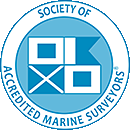How Do I Choose a Marine Surveyor?
Quoted from SAMS, Inc. (https://www.marinesurvey.org/samsfaq.html)
Anyone can title him or herself as a Marine Surveyor and start a business. Certain marine surveyors are permitted to use a designation denoting membership in accrediting organizations that require members to meet strict professional, technical and ethical standards.
Surveyors should provide you with a professionally prepared report that can be accepted by your bank and/or insurance company. Talk with prospective surveyors and ask questions! What does the survey include and what type of reporting format is used? Do they use ABYC, NFPA and USCG standards in their surveys? How much will the inspection cost? How long will the on-board inspection take?
A thorough inspection will not be rushed and will depend on the type of survey required based on vessel size, equipment and on-board systems. There may be additional services available such as engine surveys, oil analysis, galvanic and stray current corrosion testing, ultrasonic testing, moisture testing and other non-destructive tests. There may be additional charges for these and other services.
Well conducted surveys can provide good information on the vessel's condition, but they are not guarantees. The surveyor reports the condition in accessible areas only as it exists at the time of inspection.
Why should you have a vessel surveyed? Most insurance companies and banks will require them on older vessels. They will need to know its condition and fair market value in order to finance and/or underwrite the vessel. Knowing its condition and fair market value before you purchase is also important. However, the most important reason to survey your vessel is for the safety of the passengers and crew. [Top of Page]
What type of Survey do I need?
Quoted from SAMS, Inc. (www.marinesurvey.org/samsfaq.html)
Marine Surveys are performed for a number of reasons,
and the procedures for each vary to best suit your needs:
Pre-Purchase Survey
This is the most comprehensive type of inspection, and is strongly advised when purchasing a new or used vessel. Condition and overall operation of the vessel should
be examined. This covers structural integrity, electrical systems, the propulsion system, the fuel system, other machinery, navigation equipment, miscellaneous on-board systems, cosmetic appearance,
electronics, and overall maintenance as well as an out-of-water inspection and a sea trial.
Insurance Survey
This inspection is performed so that the insurance company can determine whether or not the vessel is an acceptable risk. They are interested in structural integrity and safety for its intended
use. Most insurance companies require a survey on older boats. They will also want to know the vessel's fair market value.
Appraisal Inspection
This inspection is performed to gather enough information to justify or determine the fair market value of the vessel. This is normally needed for financing, estate settlements, donations and legal
cases.
Damage Inspection
This is performed to assess the extent of damage, recommend repairs, estimate repair cost, and if requested, possible cause.

